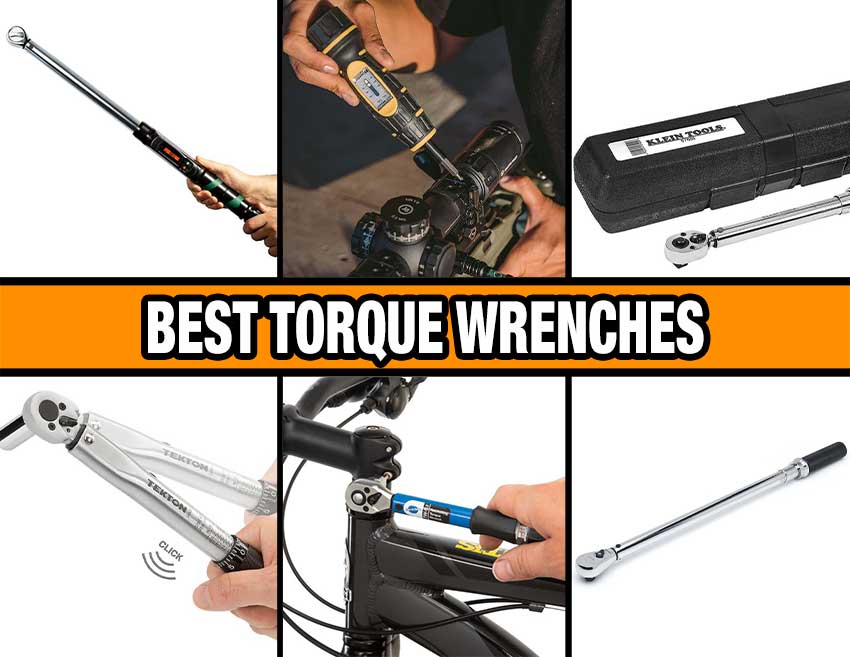With just about every tool out there, you face a vast, even overwhelming, array of choices. This is certainly true of torque wrenches. There are dozens of reputable brands that produce a torque wrench for as many jobs and applications, which can make choosing the best one for your needs a daunting task.
Our guide to the best torque wrenches in 2024 takes the guesswork out of everything from the models available and what they cost to essential background information about torque wrench usage, specifications, maintenance, and more.
Best Torque Wrenches – Our Top Picks
- Best Overall: CDI Click Style Torque Wrench 2503MFRMH – Buy from Amazon
Jump to this Wrench ↓ - Best Digital: eTORK Click-Style Torque Wrench EC3250 – Buy from Amazon
Jump to this Wrench ↓ - Best for Cars & Motorcycles: Craftsman 1/2-Inch Drive Click CMMT99434 – Buy from Lowe’s
Jump to this Wrench ↓ - Best for Bikes: Park Tool Ratcheting Torque Wrench TW-5.2 – Buy from Park Tool
Jump to this Wrench ↓ - Best for Gunsmithing: Wheeler Accurizing Torque Wrench 553556 – Buy from Amazon
Jump to this Wrench ↓ - Best 1/4-Inch: Tekton 1/4-Inch Drive Micrometer 24320 – Buy from Amazon
Jump to this Wrench ↓ - Best 3/8-Inch: CDI Dual Scale Micrometer 1002MFRMH – Buy from Amazon
Jump to this Wrench ↓ - Best 1/2-Inch: Gearwrench 1/2-Inch Drive Micrometer 85066M – Buy from Acme Tools
Jump to this Wrench ↓ - Best Inch Pound: Klein Torque-Sensing Wrench 57005 – Buy from Acme Tools
Jump to this Wrench ↓
Also In This Article
- How We Picked the Best Torque Wrenches
- Best-Selling Torque Wrenches
- Best Torque Wrench Buying Guide
- Frequently Asked Questions about Torque Wrenches
- Why You Can Trust Pro Tool Reviews
How We Picked the Best Torque Wrenches
Choosing the best torque wrenches was a tough task. I had to call upon all of my experience to determine what some of the most important factors and features might be. After that, I considered all of the different projects and tasks I’ve used torque wrenches on, and this helped me come up with a baseline of what to look for and compiled a list of worthy contenders.
I compared many models from several brands. I compared their prices, their features, their functionality, and their flexibility to ensure that each one offered plenty of value. The ones that passed my tests were given awards while those that failed were removed from the list.
Best Overall Torque Wrench
CDI Dual Scale Micrometer Adjustable Click Style Torque Wrench 2503MFRMH

Those looking for a pro-grade torque wrench that can handle some heavy-duty work should consider this ½-inch-drive model from CDI. This tool features a range of 30 to 250 foot-pounds, features a micrometer for minor adjustments, and is accurate within 4% in clockwise rotation, making it a solid choice that can handle intense tightening without sacrificing accuracy.
This model features dual scales, which means users can measure torque in foot-pounds or Newton meters. It has a spring-loaded, pull-down collar that is easy to adjust as well as laser-etched in 5-foot increments to make reading and setting the torque faster. It also has a quick-release head to make attaching and removing sockets easier and more secure, and a knurled grip to provide control when torquing at the top of this click-style torque wrench’s range. When you finish your work, you can store it in its protective storage case.
Key Features
- Quick-release button to make swapping socket sizes easier
- Accurate to within 4% in clockwise direction
- Easy to use and set to the appropriate torque
- Micrometer on handle for smaller adjustments
Specifications
- Type: Click
- Size: ½-inch
- Range: 30 to 250 foot-pounds
Price: $180.99
Best Digital Torque Wrench
eTORK Click-Style Torque Wrench EC3250
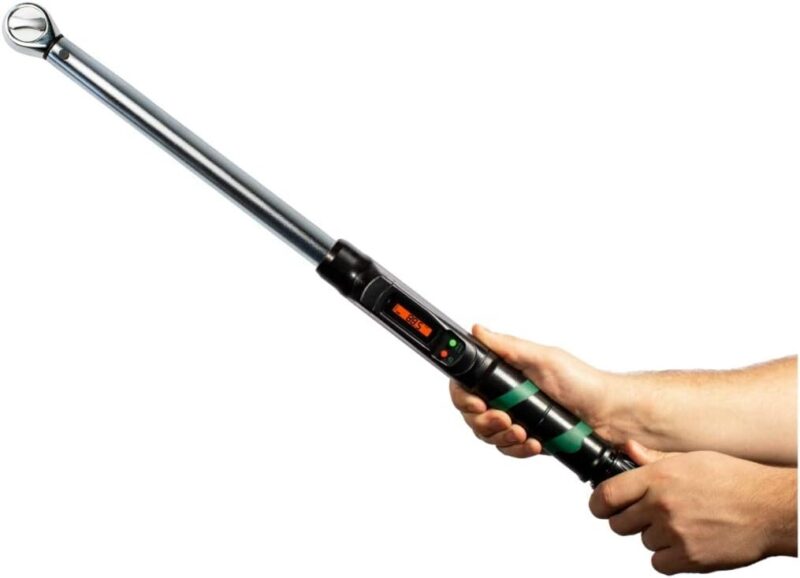
As a combination of a click-style and digital torque wrench, the eTork ½-inch torque wrench has a lot to offer. Users can set the wrench just like they would a click-style, but rather than reading small print or a tiny view window, they can use the digital, backlit display that’s easy to read. This allows for faster, more accurate setting, as the eTork provides settings down to the tenth of a foot-pound with 3% accuracy. And, to maintain accuracy, it comes with a blow-molded storage case.
Beyond the display and accuracy, the eTork has a wider range than most ½-inch models. It can measure torque as low as 25 foot-pounds or as high as 250 foot-pounds, providing plenty of range for most household repairs or professional projects. Measurements are available in foot-pound, Newton meter, inch-pound, or even kg/cm.
Key Features
- Combines the reliability of a click-style wrench with the accuracy of a digital wrench
- Easy to read digital scale
- Tactile click when wrench reaches desired torque setting
- Range between 25 and 250 foot-pounds
Specifications
- Type: Digital
- Size: ½-inch
- Range: 25 to 250 foot-pounds
Price: $114.95
Best Torque Wrench for Cars and Motorcycles
CRAFTSMAN 1/2-Inch Drive Click Torque Wrench CMMT99434

When it comes to working on cars, a torque wrench needs reach, reliability, and features that are simple to use. The Craftsman ½-inch drive click-style wrench has all that to offer and more. This ½-inch-drive torque wrench features a large adjustment collar with contrasting indicators to make adjusting the wrench easier, as well as a 27-inch long handle for applying plenty of torque. It also has a thick, heavy-duty rubber grip for plenty of comfort and to prevent slipping, and it comes with a storage case.
Key Features
- Large, easy-to-use adjustment collar
- Heavy-duty rubber handle for comfort and firm grip
- Contrasting colors for easy torque setting identification
Specifications
- Type: Click
- Size: ½-inch
- Range: 50 to 250 foot-pounds
Price: $64.98
Best Torque Wrench for Bikes
Park Tool Ratcheting Click-Type Torque Wrench TW-5.2
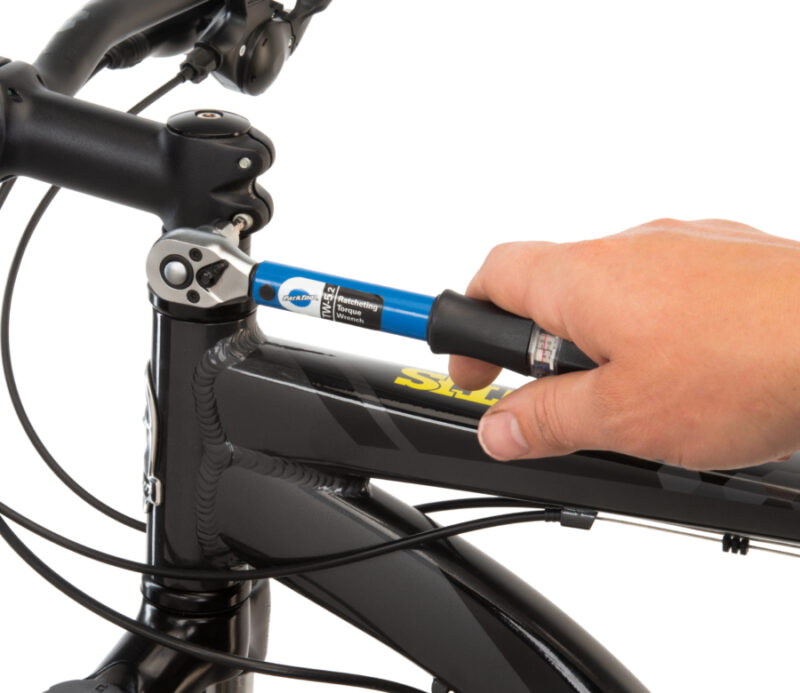
The small components and specialty materials on performance bicycles call for a bike-specific torque wrench like the TW-5.2 from Park Tool. This tool is designed for lower, more specific torque settings for carbon fiber and aluminum frames as well as seat posts, handlebars, stems, derailleurs, and more. It has a range between 18 and 124 inch-pounds, making it a great choice for dialing in those precision components.
The Park Tool TW-5.2 has other features going for it, as well. It has a comfortable rubber grip with a large, built-in view window for accurately setting the torque. It’s also accurate to within 4%, which is quite impressive for working with such small hardware. It also comes with a protective case for safekeeping.
Key Features
- Compact design with a comfortable rubber handle
- Accurate to within 4% to avoid damaging aluminum or carbon fiber components
- Large view window for accurate setting
Specifications
- Type: Click
- Size: ⅜-inch
- Range: 18 to 124 inch-pounds
Price: $101.95
Best Torque Wrench for Gunsmithing
Wheeler Manual Firearms Accurizing Torque Wrench 553556
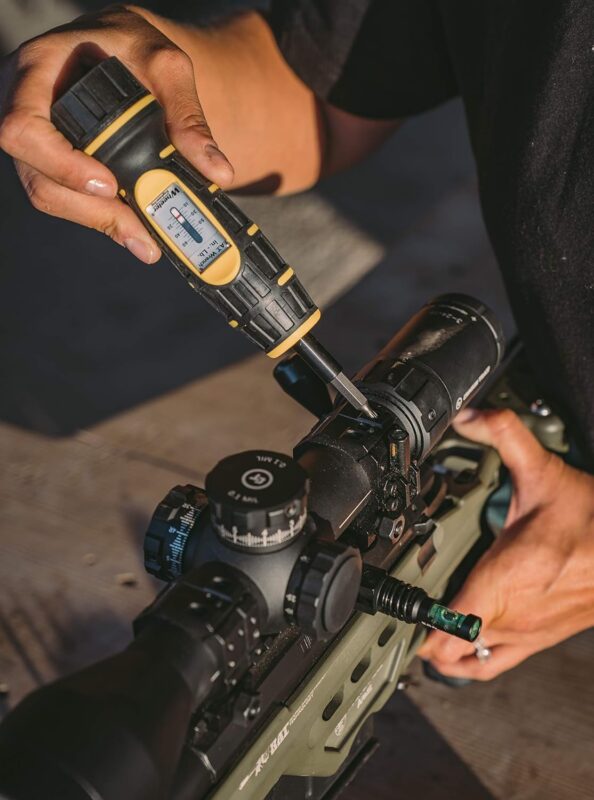
Firearm aficionados need a torque wrench they can trust, but better yet, one with a design they can use like this one from Wheeler. It features a screwdriver-style design that’s easy to manipulate around firearms and their small hardware while also providing up to 65 inch-pounds of torque.
The Wheeler has a large view window in the middle of the rubber handle, and it makes setting this model easier than standard increments would be on the shaft. Also, it comes with multiple firearm-specific bits for a range of firearm adjustment or construction needs. The torque wrench and bits all fit securely in the included storage case.
Key Features
- View window for easy torque adjustment readings
- Screwdriver design is ideal for working on firearms
- Comes with multiple firearm-specific driver bits
Specifications
- Type: Click
- Size: NA
- Range: 10-65 inch-pounds
Price: $48.99
Best 1/4-Inch Torque Wrench
Tekton 1/4-Inch Drive Micrometer Torque Wrench 24320
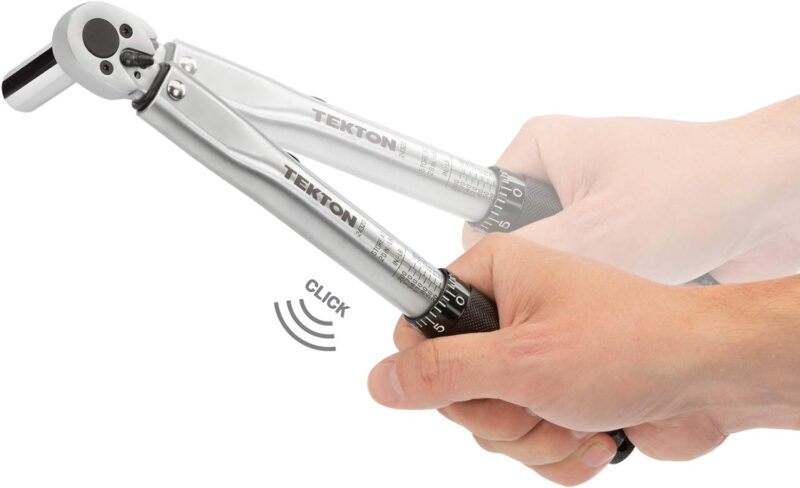
The Tekton ¼-inch drive micrometer torque wrench is a good choice for anyone who needs an affordable torque wrench for smaller, lighter-duty applications. This model features a range of 20 to 200 inch-pounds, which is generally a wider range than most ¼-inch-drive torque wrenches.
It features a knurled grip as well as a high-contrast torque scale that’s easy to read. Main adjustments are in increments of 15 inch-pounds, but the micrometer on the handle makes adjustments in one inch-pound increments. Once the desired torque setting is reached, it makes a loud, audible click to alert the user. Once the user is done, they can store it in the blow-molded case for safekeeping.
Key Features
- High-contrast torque scale with inch-pounds and Newton meters
- Micrometer on knurled handle for minor adjustments
- Wide range for inch-pounds ¼-inch torque wrench
Specifications
- Type: Click
- Size: ¼-inch
- Range: 20 to 200 inch-pounds
Price: $50
Best 3/8-Inch Torque Wrench
CDI Dual Scale Micrometer Adjustable Click Style Torque Wrench 1002MFRMH

Pros and experienced DIYers who want a quality torque wrench should give the CDI 1002MFRMH a look. This click-style torque wrench features a dual-scale design that measures in both foot-pounds and Newton meters. It also has a micrometer on the handle for finer adjustments. It can handle torque ranges between 10 and 100 foot-pounds, and it’s accurate within 4% clockwise.
This tool features a pro-grade design as well as alloy steel materials, making it durable and easy to clean. It also has a quick-release button for quickly swapping sockets. It comes with a heavy-duty blow-molded case for protection as well.
Key Features
- Rugged, pro-grade design and materials
- Quick release button for quickly and securely swapping sockets
- Dual scale design with micrometer makes adjusting for foot-pounds or Newton meters simple
Specifications
- Type: Click
- Size: ⅜-inch
- Range: 10 to 100 foot-pounds
Price: $159.45
Best 1/2-Inch Torque Wrench
GearWrench 1/2-Inch Drive Micrometer Torque Wrench 85066M
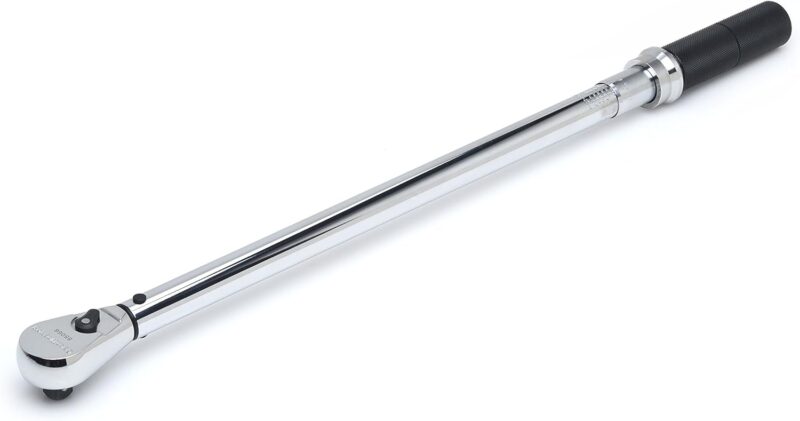
GearWrench’s ½-inch drive micrometer torque wrench is a heavy-duty tool with smart design, robust construction, and a high degree of accuracy. This click-style wrench features a low-profile head that fits in tighter places than other ½-inch torque wrenches. It also features a knurled grip and a pull-down locking collar that works well with gloved hands.
This model from GearWrench features a range of 30 to 250 foot-pounds, and it’s accurate to within 3 percent of the setting. It has a knurled grip with micrometer adjustments as well as high-visibility scale markings. It also comes with a molded plastic case to help maintain accuracy and keep it safe when it’s not in use.
Key Features
- Accurate to within 3% of the torque setting
- Low-profile head makes getting into tight spaces easier
- Locking pull-down collar works with gloved hands
Specifications
- Type: Click
- Size: ½-inch
- Range: 30 to 250 foot-pounds
Price: $140.99
Best Inch Pound Torque Wrench
Klein Torque-Sensing Wrench, 30 to 250-Inch/Pound Range Micro-Adjustable Wrench 57005
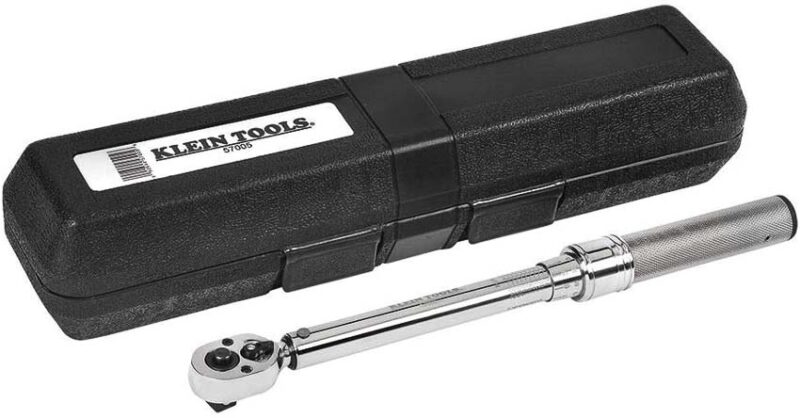
Klein’s Torque-Sensing Wrench is a click-style torque wrench with an adjustable range between 30 and 250 inch-pounds. It features a ⅜-inch drive design, making it more substantial in hand than a smaller, ¼-inch model.
This torque wrench features a quick-release push button for swapping sockets on and off, as well as a quick pull-down collar for faster adjustments. The collar also features micrometer adjustments for finer tweaks. It comes with a blow-molded case for durability and safekeeping, as well.
Key Features
- ⅜-drive ratchet with 30 to 250-inch pound range
- Micrometer adjustments on the collar
- Quick-release button for swapping sockets quickly
Specifications
- Type: Click
- Size: ⅜-inch
- Range: 30 to 250 inch-pounds
Price: $229.99
Best-Selling Torque Wrenches
So, now you have our picks for the best torque wrenches on the market. However, just because we deem a tool to be the best doesn’t necessarily mean that it’s a best seller. For example, among consumers, reasonably good features and performance can trump cutting-edge quality when they’re paired with an attractive price tag. That said, you might be wondering which torque wrenches are flying off the shelves. If so, this will help.
Best-Sellers at Acme Tools
- DeWalt 1/2-Inch Drive Torque Wrench Tire Change Kit DWMT17107 – $109.99
- GearWrench 3/4-Inch Drive Electronic Torque Wrench 85082 – $999.99
- Proto 1/2-Inch Drive Ratcheting Head Micrometer J6016CXCERT – $348.99
Amazon
- EPAuto 1/2-Inch Drive Click ST-010-1 – $38.87
- LEXIVON 3/8-Inch Drive Click Torque Wrench LX-182 – $34.97
- Tekton 3/8-Inch Drive Micrometer 24330 – $50
Lowe’s
- Kobalt 1/2-in Drive Click Torque Wrench 81704 – $99.98
- CRAFTSMAN 3/8-Inch Drive Click CMMT99433 – $54.98
- Tekton 1/2-in; 3/8-in; 1/4-in Drive Micrometer Set TRQ99901 – $165
Home Depot
- Milwaukee M12 Fuel 3/8-Inch Brushless Wrench 2465-20 – $699
- GearWrench 1/2-Inch Drive 25-250 ft./lbs. Electronic 85077 – $149.97
- Husky 3/8-Inch Drive Electronic H3DETW – $174
Best Torque Wrench Buying Guide
Understanding Torque Specifications
Torque wrenches are generally used when a fastener needs to be tightened to a certain specification. This can be for several reasons. Whether it’s the material that the bolt secures or the bolt’s material itself, manufacturers recommend torque specifications to ensure that the item being assembled or repaired is in proper working order.
The Importance of Accurate Torquing
When it comes to assembling a dining room table or driving a screw through a board, torque is not a concern. However, when assembling mechanical items such as installing engine heads or a bicycle derailleur, accurate torquing is a must.
Let’s consider if the bolt is too loose. In many cases, this can affect the way gaskets seal, the alignment of other mechanical components, or even cause parts to come loose during use. For this reason, it’s important to ensure that you tighten the fastener to the correct spec.
On the other hand, over-torquing can be just as bad. Over torquing can cause bolts to stretch too much, or snap the head off the shaft. Also, in the case of something like an aluminum wheel, too much torque can deform the wheel. Applying too much torque can also impact gaskets, cause them to crush rather than seal, or create tolerances that are too tight for mechanical items to operate properly.
Generally speaking, when a manufacturer recommends a specific torque setting, it’s for a reason and users should try to abide by the recommendation.
Interpreting Torque Ratings and Tolerances
Torque ratings are units of measure, and they vary depending on the fastener’s size and task. The two common torque ratings are foot-pound and inch-pound. These units refer to the amount of effort or weight applied to a rotational axis by a lever at a distance of one foot. That might sound complicated, but in our case, the rotational access is a fastener, and the lever would be the torque wrench.
A foot-pound is 12 times larger than an inch-pound. Therefore, feet-pounds are used to torque larger, more heavy-duty fasteners while inch-pounds are used to torque smaller, more exact fasteners. So, a lug nut holding a steel wheel to a steel hub would use foot-pounds (typically around 80 to 90 foot-pounds). However, a stainless fastener holding a brake to an aluminum bicycle frame might require 50 to 60 inch-pounds.
Another term used to describe torque may be Newton meters, but most modern torque wrenches will offer both foot-pounds (or inch-pounds) and Nm.
Depending on the task, a torque rating may have a tolerance associated with it. This range explains either the lowest and highest torque settings that a fastener should be torqued to, or a percentage above or below the recommended spec that the manufacturer states is acceptable. For example, our lug nuts above can be torqued to 80 to 90 foot-pounds, so a setting between these two bookends is acceptable. But, finer bolts might have a tolerance of plus or minus 2%.
Types of Torque Wrenches
There are several types and each has its pros and cons. The following explanations will break down these different types and explain how they work so you can choose the best option for your needs.
Click Type Torque Wrenches
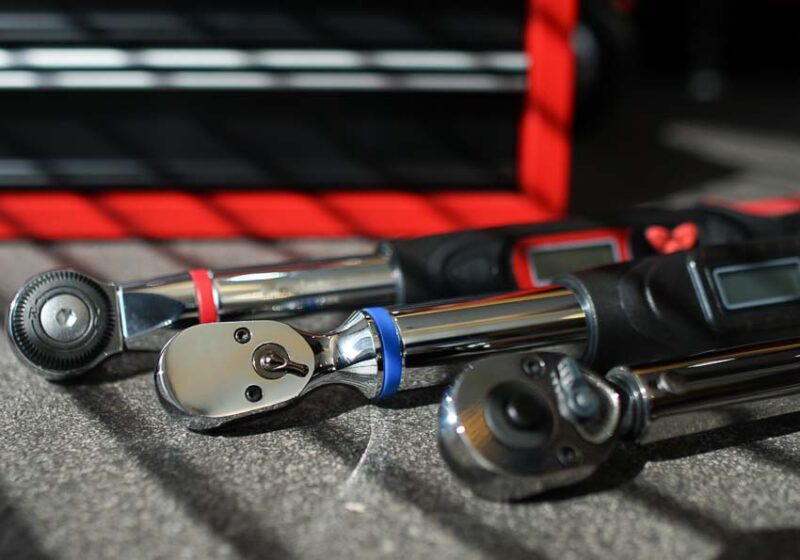
Click-type torque wrenches allow the user to set the wrench to a specific torque setting. Generally speaking, there will be a knob at the bottom of the handle, and the user can twist the knob to increase or decrease the desired torque. Once set, the user will experience an audible and tactical click once they apply that set amount of torque to the fastener. Click-type wrenches are easy to use, fairly accurate, and run in the middle of the affordability range.
Beam Type Torque Wrenches
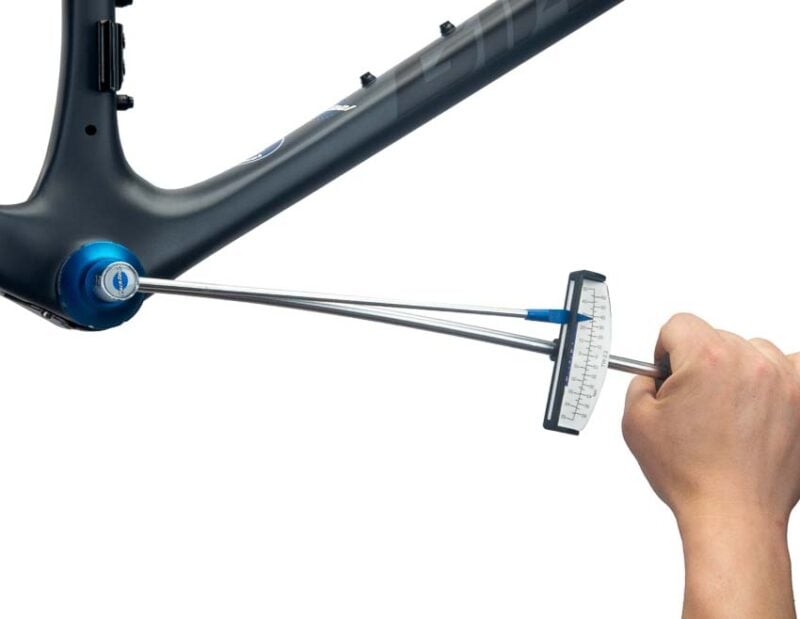
Beam-type wrenches have a beam that runs parallel down the back of the torque wrench. This beam has a point that lands on a scale near the handle, and as the user applies torque to a fastener, the indicator will move on the scale and point to the amount of torque being used at that moment.
Beam-type torque wrenches are inexpensive, but they’re also potentially inaccurate. If the beam bends, the wrench is no longer calibrated. Also, since there isn’t an audible or tactile indication when the desired amount of torque is reached, it’s very easy for a user to overtighten the fastener. They can also be very clumsy thanks to the scale sticking out to either side.
Programmable Electronic Torque or Digital Wrenches
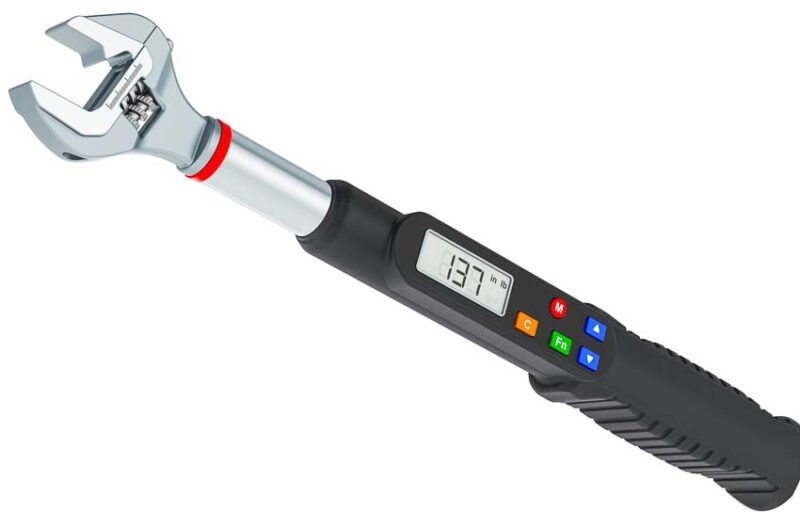
Programmable electronic torque wrenches feature digital displays that the user can set to the desired torque setting. Once the wrench experiences the specified torque output, it may beep or vibrate to indicate to the user that they should stop torquing.
Digital wrenches can be expensive. However, they’re very accurate and easy to use. And since the indicating beep and vibration are hard to miss, users are less likely to over-tighten a fastener.
Drive Sizes
Common torque wrenches come in one of three drive sizes: ¼-inch, ⅜-inch, and ½-inch. These numbers refer to the size of the drive head (the square on the ratchet head that fits inside a compatible socket). This is essentially the same as a standard ¼-inch ratchet, which fits ¼-inch-drive sockets, ⅜-inch-drive for ⅜-inch sockets, and so on.
While users can attach adapters to size up or down, it’s not always ideal. A ⅜-inch-drive torque wrench’s long handle makes it difficult to apply torque accurately to a ¼-inch drive socket, and could even snap the adapter. A better option is to simply have two or three drive sizes, if possible.
When and Why to Use a Torque Wrench
There are a lot of uses for torque wrenches. These tools are often used any time a fastener must stretch a specific amount when using bolts made from certain materials, or several other applications.
Automotive Applications
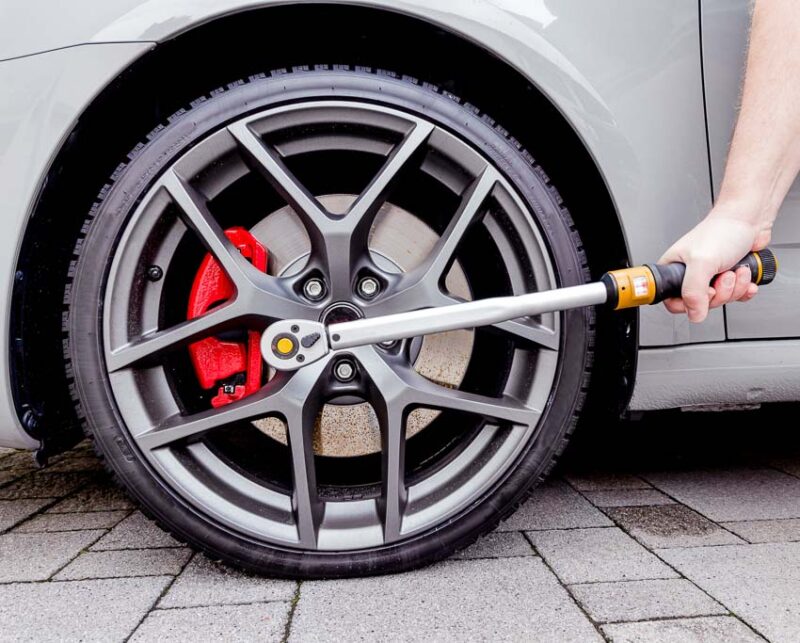
Contrary to what some home auto mechanics (or even those guys at the local discount tire place) might think, you should not install wheels with an impact wrench like it’s a NASCAR pit stop. Instead, lug nuts should be torqued to specific settings. Most of the time, these settings are between 80 and 90 pounds, but some aluminum wheels might require less torque.
Engine assembly is one of the most common tasks for which a torque wrench is a must. Every bolt in an engine should be tightened to a specific torque. Otherwise, fasteners could strip threads, break off in the engine block, deform components, or cause leaks. For example, some cylinder heads are made from aluminum as are the bolts that attach the exhaust manifolds to them. Applying more than the prescribed torque could strip the holes or sheer the head of the bolt.
Construction and Industrial Usage
When engineers create plans and drawings, every piece of hardware is chosen specifically for its strength to ensure it can handle the task at hand. As such, these fasteners must be torqued to the correct tightness to ensure they’re not stretching too much and that each bolt is applying even pressure. Entire buildings can be held together by these fasteners, so the torque amount must be correct.
Heavy machinery and equipment also need proper torquing. Ensuring that the powerful electric motors that operate building equipment like elevators, escalators, manufacturing equipment, and other mechanical equipment are bolted down correctly is a matter of safety. The bolts need to be tightened down to the correct torque setting to ensure they don’t deform the mounting brackets or stretch and weaken the bolts, but also so the machine doesn’t jump around when the motor engages.
Cycling and Bicycle Maintenance
Many modern bicycles and their components are made from performance materials like aluminum and carbon fiber. When cyclists adjust or change components, improperly torquing the fasteners down can either strip the threads inside the hole or crack the carbon fiber altogether.
It’s also important that all components on a performance bike are operating properly. Uneven pressure across the bolts securing the crankset, for example, can lead to an asymmetrical rotation and cause performance issues. Also, over-torqued brake fasteners can throw the brake caliper out of alignment, causing drag and premature wear on the disc or pads.
Storage Tips
Store your torque wrench in the proper conditions to ensure it works for years to come. Avoid extremely high or low temperatures, as these conditions can impact the tool’s reliability. Also, high humidity can impact the accuracy and cause premature corrosion. Also, for click-style torque wrenches, always lower them to zero before putting them in storage.
Maintenance and Calibration
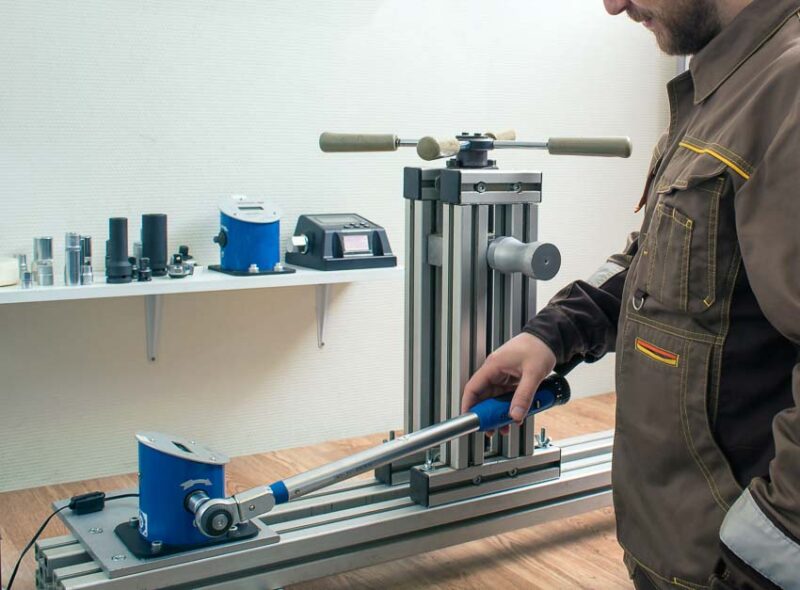
You should check your torque wrench for accuracy every six months (or more often if you frequently use yours).
A rudimentary way to test the wrench is to clamp the drive square into a vice and position the handle so it’s parallel to the ground. Place a small piece of tape 12 inches down the handle from the square. Set the wrench to 5, 10, or 15 foot-pounds. Hang the prescribed amount of weight from the handle at the 12-inch mark. If the torque wrench clicks, adjust it to 1 foot-pound more. Hang the weight again. If the wrench doesn’t click, you know it’s accurate.
While this method is relatively simple, you can send your wrenches out for professional calibration if you don’t feel comfortable doing it yourself. Many manufacturers will calibrate their tools for a fee, but, if need be, you can also hire a third-party calibration and testing service. The wrench will come back to you with a certificate verifying that it is properly adjusted and accurate.
Frequently Asked Questions About Torque Wrenches
How do I properly use a torque wrench?
Assuming you have the proper torque wrench for the job, here are the steps to using one:
- Tighten the fastener by hand or with a standard ratchet until it’s relatively snug.
- Refer to the manufacturer’s recommendations for torque
- Twist the knob at the bottom of the torque wrench to set the wrench to the proper torque setting. If you have a digital wrench, use the display to set the torque wrench.
- Attach the proper socket to the torque wrench and place it on the fastener.
- Apply torque to the fastener with the torque wrench, listening for the click, beep, or vibration.
- Remove the torque wrench.
How often should a torque wrench be calibrated?
A torque wrench should be calibrated once every six to 12 months. Frequency of use does play a factor, and users can perform self-checks to ensure their wrenches are reasonably accurate.
Can I use a torque wrench for loosening bolts?
You can but you should not. Torque wrenches are precision tools and should not be used for general tightening and loosening. Instead, use a standard ratchet until the bolt is reasonably tight and finish with the torque wrench. Don’t use the torque wrench for loosening for any reason.
What is the significance of ‘click’ in a click-type torque wrench?
The click occurs when the set amount of torque is reached. It’s an indicator to the user that they should stop applying torque to the fastener to prevent over-tightening.
How should I store my torque wrench to ensure longevity?
Lower the setting of the torque wrench to zero (for click-type torque wrenches). Place the wrench in its case and store it away from extreme heat, cold, or high humidity.
Why You Can Trust Pro Tool Reviews
Ever check out a “review” site and you can’t tell if they actually tested anything or if they’re just “recommending” the Amazon top sellers? That’s not us. We won’t recommend anything unless we’d use it ourselves, and we don’t really care who the primary retailer is. It’s all about giving you a legitimate recommendation and our honest opinion of each product.
We’ve been in business since 2008 covering tools, writing reviews, and reporting on industry news in the construction and lawn care industries. Our Pro reviewers work in the trades and have the skills and experience to know whether tools can perform well in the field.
Each year, we bring in and review more than 350 individual products. Our team will put our hands on hundreds of additional tools at media events and trade shows throughout the year.
Pro Tool Reviews consults with innovators in the technology and design of tools to gain a broader grasp of where these products fit and how they work.
We work with more than two dozen professional contractors around the United States who review products for us on real job sites. We consult with them extensively on testing methods, categories, and practical applications.
Our site will provide more than 500 pieces of new content this year absolutely free for our readers. That includes objective evaluations of individual tools and products.
The end result is information you can trust because of the editorial, scientific, and real-world professional experience we collectively utilize each and every time we pick up and test a tool.

